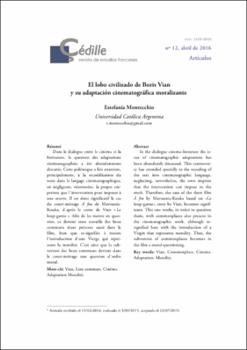El lobo civilizado de Boris Vian y su adaptación cinematográfica moralizante
Autor
Montecchio, EstefaníaFecha
2016Resumen
In the dialogue cinema-literature the issue of cinematographic adaptations has been abundantly discussed. This controversy has attended specially to the recoding of the text into cinematographic language, neglecting, nevertheless, the own imprint that the intervention can impose to the work. Therefore, the case of the short film À feu by Mavounia-Kouka based on «Le loup-garou», story by Vian, becomes significant. This one works, in order to question them, with commonplaces also present in the cinematographic work, although re-signified here with the introduction of a Virgin that represents morality. Thus, the subversion of commonplaces becomes in the film a moral questioning. Dans le dialogue entre le cinéma et la littérature, la question des adaptations cinématographies a été abondamment discutée. Cette polémique a fait attention, principalement, à la recodification du texte dans le langage cinématographique, en négligeant, néanmoins, la propre empreinte que l´intervention peut imposer à une œuvre. Il est donc significatif le cas du court-métrage À feu de Mavounia-Kouka, d´après le conte de Vian « Le loup-garou ». Afin de les mettre en question, ce dernier texte travaille des lieux communs étant présents aussi dans le film, bien que re-signifiés à travers l´introduction d´une Vierge qui représente la moralité. C’est ainsi que la subversion des lieux communs devient dans le court-métrage une question d´ordre moral.





